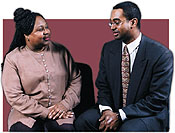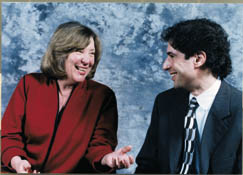| |
![]()
Vol. 71, No. 3, March
1998
Mentoring: Reaching Out, Giving Back
Opening doors
William Boulware, now in his third year as a corporate counsel for the
Ho-Chunk Nation, also recognizes the cycles that mentoring relationships
pass through. He has occasional contact with his three mentors Madison
attorney Brian Butler, Dane County assistant district attorney Barbara Franks
and former Texas judge Thomas Gibbs but not as often as he once did,
primarily because none of his mentors practice in Boulware's primary area:
Indian law. Still, he describes all three of his mentors as major forces
in guiding him during law school and starting out as a lawyer.

William Boulware credits Dane County assistant district
attorney Barbara Franks with letting him tag along in family court, familiarizing
him with "the nuances of how a court works. Franks is one of three
mentors Boulware looks to, including Madison attorney Brian Butler and former
Texas judge Thomas Gibbs.
Photo: Steve Milanowski Harper/Fritsch Studios |
His connection with Gibbs goes back to Boulware's days of clerking at a
Houston law firm. Gibbs had stepped down from the bench and come to work
for the same firm. "We just clicked very easily," Boulware notes.
"He kept in touch with me all through law school, sending me articles,
critiquing my skills."
While a law student at the University of Wisconsin, Boulware met Butler
at a State Bar function cosponsored by the law school. "He saw my name
on the program and noticed I was a Dartmouth alum," Boulware says.
"He's also a Dartmouth alum, so he took me under his wing. He was instrumental
in providing me information and plugging me into the system."
As for Franks, whom Boulware met through a minority lawyers' group, Boulware
credits her with letting him tag along in family court, familiarizing him
with "the nuances of how a court works," he says. What's more,
she helped "in keeping me sane and in working through a lot of issues
during law school," he adds.
Now Boulware is ready to pass on the favors others extended to him. He
recently signed up as a mentor with the State Bar's Mentor Program, plus,
through his work, he connects with young people who want to be lawyers someday.
"The shoe is definitely on the other foot," he says.
Anne Ertel-Sawasky remembers numerous occasions when she felt her mentor
wasn't doing her any favors at all. "I can remember many times when
he gave me projects to do that made me want to tear my hair out," she
says. "And yet, after I finished them, I'd look back and say, 'Wow,
I really grew doing that. I learned a lot.'"
Ertel-Sawasky met her mentor, Ken Podell, 10 years ago when she graduated
from law school and took a job as general counsel at Aid Association for
Lutherans (AAL), an Appleton-based insurance company. Podell was her supervisor.
Although Podell constantly challenged her, Ertel-Sawasky says he didn't
leave her floundering on her own. "His door was always open,"
she notes. "I don't remember one time in 10 years that I went in and
asked him a question that he didn't put aside everything and sit down and
explain things to me."
Equally important, Podell let Ertel-Sawasky challenge him. She felt free
to ask why, to push him to explain his position and to let him know when
she didn't agree. "That wasn't a threat to him," Ertel-Sawasky
explains. "I think he viewed it as good for my development, to hone
my legal thinking, and good for him because I might think of something he'd
overlooked."
Last February Ertel-Sawasky left AAL to set up her own law practice.
She still calls Podell now and then with a question, and he's now one of
her clients. "I don't think I would have developed the kind of legal
skills I have if he hadn't been there for me," she says. "Without
Ken's mentoring, I never would have grown into the attorney I am today and
taken this major step in my career."
Feeling connected
Madison attorney Jordan Loeb grew up with a "built-in mentor,"
he says, namely his father, Milwaukee lawyer Leonard Loeb. The younger Loeb
belongs to the Madison chapter of the American Inns of Court, the organization
his father helped bring to Wisconsin. "Just going to the monthly meetings
is mentoring," he explains. "We have a presentation, there's a
discussion afterwards, and we adjourn for dinner. That in and of itself
I consider to be a valuable mentoring system."
In addition, the Madison chapter pairs new lawyers or law students with
more experienced attorneys for one-on-one mentoring. That's how Loeb became
linked with his second mentor, Madison attorney

Madison attorney Jordon Loeb found a mentor in Susan Steingass,
also a Madison attorney and State Bar president-elect. He describes Steingass
as "a very well-rounded person who has life and law working in balance,
and she was able to give me encouragement that way." Loeb also receives encouragement
from his other mentor, his father, Milwaukee attorney Leonard Loeb. |
and State Bar president-elect Susan Steingass. They first were paired when
Loeb was a third-year law student four years ago, and now recently have
been rematched as mentor and mentee for the coming year. Looking back on
the first time around, Loeb says, "The value in it to me was just knowing
I had that connection. She's a very well-rounded person who has life and
law working in balance, and she was able to give me encouragement that way."
"The other thing," he adds, "was that when I showed up
at the Inns of Court meeting as a third-year law student, intimidated, wearing
the same suit every time because it was the only suit I owned, with all
these good, flashy lawyers around, there was someone there who greeted me
and introduced me to other lawyers. Having her say hello to me in front
of a bunch of lawyers was like a confirmation that I existed."
Now that he and Steingass are matched again for the coming year, Loeb
says, "I don't have an agenda, but I imagine I will discuss with her
how my career is going, compare notes with the beginning of her career,
ask her what she thinks the good opportunities in law are right now. Who
knows?"
Like Loeb, Milwaukee lawyer Sheila Parrish-Spence had her father, former
Milwaukee County Circuit Court judge Clarence Parrish, as her first mentor.
"He had notebooks of how to do things, what to look for," Parrish-Spence
says. For instance, "if you have a guardianship case, these are the
questions you should ask. Or if the other lawyer doesn't ask for this, you
should immediately move to dismiss. They were the things he had to learn
the hard way because no one would help him."
"I'll never forget," she adds, "just before he died [in
1992], he said, 'You can have my scales of justice, my judge statutes, and
I want you to go into the garage and take all those notebooks.' Now I have
them in my office. They're precious; I can look up anything."
Parrish-Spence says her father also mentored her through role plays of
court proceedings, and he was only a phone call away when she needed information
or advice. Today, she says she doesn't have one exclusive mentor, but the
two Inns of Court chapters in Milwaukee that she belongs to fulfill many
of the same mentoring functions her father once did. "Right now it's
group mentoring," she explains. "But through this group I know
whom to call when I need one-on-one." Today Parrish-Spence also mentors
others, whether through connections at the Inns of Court, the National Association
of Black Women Attorneys (for which she's the North-Central region's director)
or the Wisconsin Association of Minority Lawyers.
"The important thing to remember about mentoring," Parrish-Spence
says, "is that none of us got where we are alone. We all need to be
helped, and we all need to give help. I think that's the right thing to
do."
Dianne Molvig operates Access Information Service,
a Madison research, writing and editing service. She is a frequent contributor
to area publications.
|
